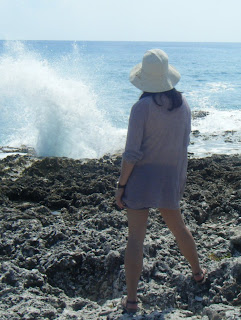I spent a good portion of my spring break vacation walking around sniffling and sneezing. I thought I had some undefined allergic reaction to something on the ship, but I came back to Houston and was still sick for a few more days! I made sure to eat oranges every day, because well, isn't vitamin C supposed to be effective in enhancing your immune system? I've read from various websites that vitamin C is the "miracle drug", curing everything from common colds to cancer, and sought to seek out how and why.
Here are some "facts" about vitamin C(ascorbic acid)
Vitamin cures the common cold.
FALSE
Since most of the myths about vitamin C involves the common cold, let's begin by stating that vitamin C will not prevent or cure colds. Studies have found that athletes in subarctic conditions may benefit from vitamin C which apparently in this condition, helps prevent colds. Vitamin C may, however, shorten the duration of the cold for those living in humid Houston, so it is a good idea to be eating those oranges and kiwis. It was found in a 11-week long study with 45 volunteers that supplemented vitamin C consumption (1g/day) led to a maintenance of IgA levels compared to the decline in the control group.
You can overdose on vitamin C.
TRUE(kind of)
Vitamin C is a water-soluble vitamin with a recommended daily amount of 90mg for men, and 75mg for women. (One medium orange contains 70mg of vitamin C. Eat one plus some more!) The upper limit for vitamin C is 2000mg/day, but since it is a water-soluble vitamin, it will simply flush out of your system, literally. Huge overdose of vitamin C(5-10g/day) can have an extreme laxative effect.
Vitamin C can cure cancer.
FALSE(kind of).
Linus Pauling, the great chemist and a two-time Nobel Prize winner, advocated a daily megadose of vitamin C (10-12g/day). He wrote a book called "Vitamin C and the Common Cold" where he advocates taking large daily doses of vitamin c to treat the common cold and even cancer. It's difficult to ignore someone who has the world's greatest achievement in sciences. In response, the Mayo Clinic conducted a study on 150 cancer patients which showed that high-dose of vitamin C had no beneficial effect on treating cancer, to which Pauling stated the consumption of vitamin C had to be intravenous. There continues to be studies with mixed results to this date, but no study has given definite conclusions yet. A recent study found that vitamin C may be useful in treating inflammation from cancer since ascorbic acid levels decrease in patients with advanced cancer.
Here's a semi-related (I was sick here!) picture that is fb-lagged
at the blow hole in Grand Cayman
The verdict, as of now anyway, is that you need sufficient levels of vitamin C, but whether increasing your consumption of vitamin C will benefit you, is still a mystery. This is a lot of qualifiers in a sentence! Well, the truth is that there are still studies being done on the effects of vitamin C on different diseases and the immune system. I imagine it is difficult to draw a definite conclusion when there is still gaps in our knowledge about the disease and the immune system.




























